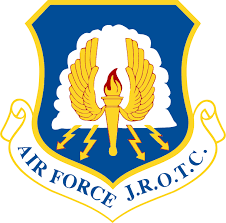Karns High School
Air Force JROTC Unit TN-932 located at Karns High School Knoxville TN

AFJROTC Curriculum
The success of the AFJROTC program lies in its progressive and academically sound curriculum and the numerous extracurricular activities AFJROTC offers students. AFJROTC is a 3- or 4-year program offered to high school students in grades 9-12. The curriculum includes Aerospace Science (AS) and Leadership Education (LE), and Wellness components. All students are granted academic credit applicable toward graduation requirements for the successful completion of AFJROTC courses provided by the Air Force equivalent to credit given for other academic courses per the Air Force School Agreement. Each academic course must consist of Aerospace Science (AS), Leadership Education (LE) and Wellness components.
Units determine which aerospace science and leadership courses to offer to first-, second-, third- and fourth-year cadets.
- AS-100: A Journey into Aviation History
- AS-200: Global and Cultural Studies
- AS-210: The Science of Flight; Cultural Studies: An Introduction to Global Awareness
- AS-300: The Exploration of Space
- AS-310: Introduction to Astronomy
- AS-400: Management of the Cadet Corps
- AS-410: Survival
- AS-420: World Geography: Building a Global Perspective
- AS-430: Policy and Organization
- AS-440: Laboratory Manual
- AS-500: Aviation Honors Ground School
- LE-100: Citizenship, Character and Air Force Tradition
- LE-200: Communication, Awareness, and Leadership
- LE-300: Life Skills and Career Opportunities
- LE-400: Principles of Management
- Academic studies
- Character education
- Life skills education
- Leadership opportunities
- Team-building experiences
- Intramural competition
- Field trips / training opportunities
In an effort to produce well-informed and helpful citizens, AFJROTC encourages its cadets to get involved in their local communities. This is one of the most interesting and fun aspects of the AFJROTC experience. The number, type and size of cadet community projects are limited only by our imagination. Many cadets also volunteer their time to support local non-profit events. Some of these organizations include the March of Dimes, the Muscular Dystrophy Association, the Adopt-a-Highway Program and the Special Olympics. Cadets have worked to clean and refurbish cemeteries, rebuild parks, sponsor little league teams and work with the visually and mentally impaired. Cadets routinely visit homes for the aged, hospitals, veterans groups and many other agencies to demonstrate their resolve to help their community and their country.




